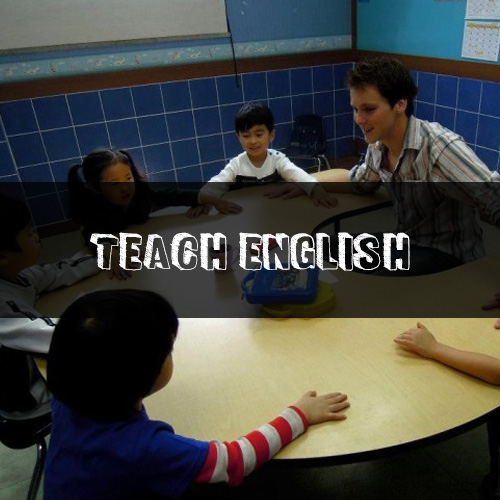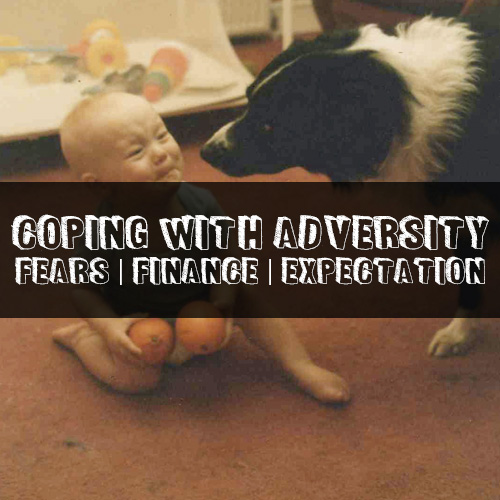Quitting your job to live your life isn’t about giving up all responsibility and wandering aimlessly into the jungle to survive on coconuts and happy vibes (presumably whilst walking around in a grass skirt day and night) – it is about getting rid of the bad things in your life to make room for your passions. It is about minimising time spent on unpleasant experiences in your life in order to make time for the things that you love, so that at the end of each day (or on as many days as possible) you can say ‘Today I did something that mattered to me and my life is richer for the experience’. It is about enjoying life on a day-to-day basis. I loosely break it down to this…
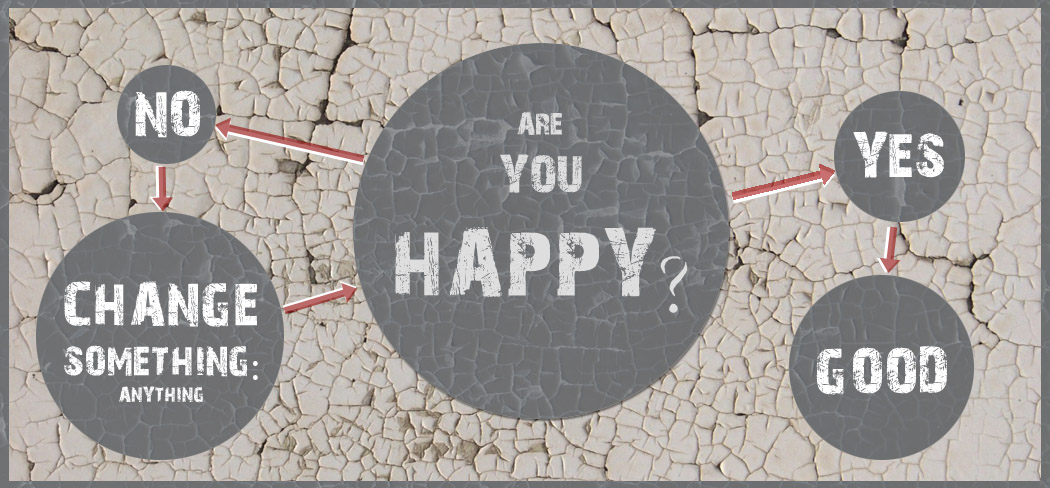
If you answered ‘No’ to the above question, ‘Are you happy?, I suggest you read The Avant-Garde Life. It is a book I wrote that is completely free to download and assesses the barriers in life that stop you from living life in a way that you want to live it. It has been downloaded over 20,000 times already and addresses many of the issue on this page.
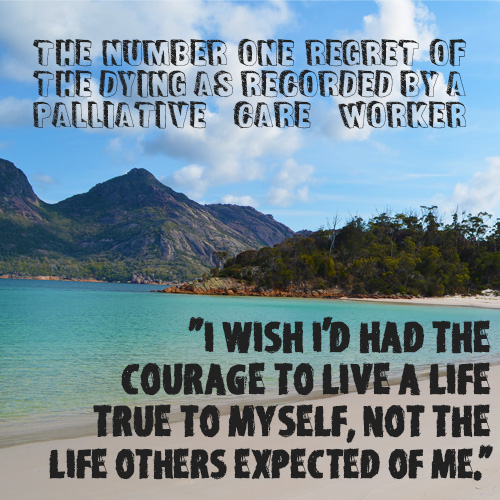 To put the happiness question a different way, what it is asking is, “If you make no changes to the way that you live your life right now, will you regret it when you are on your death bed?” I relate this to the fascinating study by palliative care worker, Bronnie Ware, who asked patients (close to death) what their biggest regrets were in life. The list of responses is fascinating, but the number one regret that people offered was, “I wish I’d had the courage to live a life true to myself, not the life others expected of me.” There are many people in life who tell you what it is that you should be doing or how it is that you should live your life. They often cite (loosely) a ‘correct’ way to live life that is generally accepted by society:
To put the happiness question a different way, what it is asking is, “If you make no changes to the way that you live your life right now, will you regret it when you are on your death bed?” I relate this to the fascinating study by palliative care worker, Bronnie Ware, who asked patients (close to death) what their biggest regrets were in life. The list of responses is fascinating, but the number one regret that people offered was, “I wish I’d had the courage to live a life true to myself, not the life others expected of me.” There are many people in life who tell you what it is that you should be doing or how it is that you should live your life. They often cite (loosely) a ‘correct’ way to live life that is generally accepted by society:
- Go to school and work hard
- Get a good job and start saving for retirement
- Buy a house and settle down with a family
- Retire and reap the fruits of a lifetime of labour
There is nothing wrong with this well trodden path in life if it offers you happiness, but it isn’t right for everyone – myself included. I went to school and worked hard, I got a Masters in Mathematics, I started to look at jobs that were available to me… then I decided that I was looking for a more diverse route through life – a life less planned if you will. Withdrawing the single job application that I submitted, I promised myself that I would do three things:
These were three things that I had never done before and that all sounded extremely exciting to me. I made these three things happen without too much difficulty – volunteering on a school building project in Uganda, working as a ski Rep in the French Alps, and teaching English in South Korea – and I loved each experience in so many different ways. Instead of going back to mathematics at the end of my short list, I just kept on adding things to the list that I wanted to do and then found a way to make them happen. Let’s talk about you now..
TAKE THIS QUIZ ABOUT YOUR LIFE
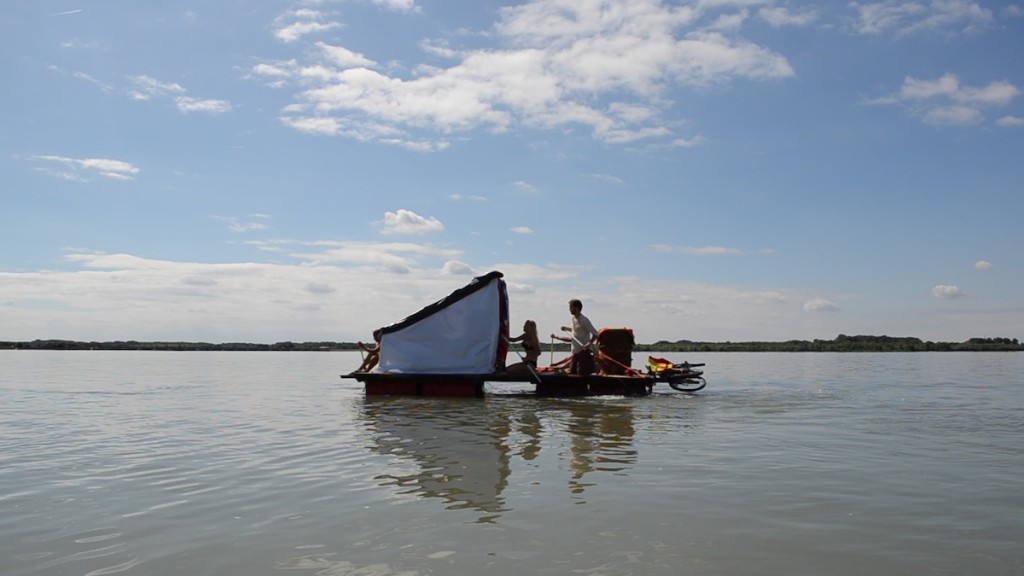
Enjoying my daily life, rafting the Danube on a homemade pirate ship
This is a quiz about the way you live your life on a daily basis and how happy it makes you. I’d like you to answer honestly – you don’t have to show anyone your answers – and I’d like you to write each answer down before progressing to the next question. Grab a scrap of paper, type in a text document, or do anything else to record your answers so that you can assess them at the end. If you try to keep them in your head, you will unintentionally twist your responses before you get to the end of the quiz, making the exercise entirely pointless, so please do record them somewhere for your own assessment.
QUESTION 1:
Yes or no: In ten years time, if you have made no changes to your current life, do you think that it will have taken you in a direction that will be making you happy, fulfilled, and free from regret?

Enjoying my daily life, walking across Iceland with my brother
QUESTION 2:
If you had an immense sum of money (let’s say $50 billion), how would you live your life on a day-to-day basis? I’m not talking about buying helicopters and houses, and giving money to charity – we’d all do that stuff – what I’m asking is what would you do on a daily basis aside from the ‘big things’. Think out your weeks and your months and what it is that you would like to be doing when earning money is no longer a necessity.
QUESTION 3:
When you wake up each morning, do you look forward to the day that awaits you? We all have special days that excite us, but do you generally feel happy about getting up in the morning for your normal routines?
QUESTION 4:
If you could wake up in 5 different places for the next 5 days, where would you choose to wake up?
You should now have a little scrawl of answers that could help to shape your life. If you read the questions without writing down answers, STOP! Write down your answers so that you know what they are. Sometimes we don’t know ourselves as well as we think we do and I will go back through these questions every so often in the hope of keeping me progressing as a person. When your answers are recorded, head on over to the ‘Do You Like Your Life?’ quiz page for an interpretation of the answers to these questions. I put the answers there because there is already lots of information on this page, but once you’ve had a read through the page, you can come back here and carry on.
What I want you to take from the quiz is a self-assessment of the way you currently live your life (questions one and three), a realisation that you don’t need vast sums of money to do the things in life that you want to do (question two), and to start thinking about what else in life you might want to do / where you want to do it (questions two and four). If your answers indicated that your current life is perfect, that’s brilliant – keep doing what you do and be happy to know that you are currently on a positive path in life. I think it is important to regularly reassess our daily lives to make sure that we are doing what is best for us, thus I do this activity fairly regularly to evaluate where I’m at and where I want to be.
HOW THESE QUESTIONS AFFECTED MY LIFE
You can read more about me on my life story page to understand how I got where I am today, but since completing my first ‘list’ (see question 2, above) of volunteering, teaching English, and working in a ski resort, here are a few of the bigger things that I added to my updated list and have done over the past few years. Each of them has made me happy on a daily basis (although not continuously because that would be impossible):
-

Enjoying my daily life, working on our van to camper van conversion
- Cycled 1,000 miles on a £30 bicycle (because it was all I could afford)
- Rafted down the Danube river on a homemade pirate ship
- Lived on a beautiful island, somewhere south of South Korea
- Volunteered on a boat building farm to learn about bees
- Walked across Iceland with my little brother
- Squatted in an abandoned building on a Greek island
- Lived, worked, and travelled around Australia
- Not cycled the length of New Zealand
- Converted a van to a campervan
This list is like a list of headings. I could talk for hours about each experience and I could tell you how you can do each of these things because none of them require great bravery, large amounts of finance, or big skill sets. The important thing here though is that during each of these experiences, it wasn’t the final objective that made me happy, it was the small occurrences that happened on a daily basis. I wasn’t happy because I was walking across Iceland, I was happy to be out in raw nature each day, encountering a landscape that I could never imagine whilst pushing myself to my mental and physical limits. I wasn’t happy to hitchhike around Europe for six months with no plans, I was happy each day to encounter strangers, make connections, and try new experiences that I couldn’t have paid for. I wasn’t happy to build a pirate ship and live on it, I was happy each day to be living on the river and follow its meandering path, cooking food over an open fire, and sleeping on the river bank.
These things that I have done worked for me, but they would not be right for most other people. Thus the key here is not to do as others have done, but to empower yourself to follow your own passions. By doing this we hope to find happiness and fulfilment – I often see fulfilment as a long-term form of happiness concerning satisfaction over the way we live our lives over extended time periods, whereas happiness is a short term feeling generated by what we do. To liken it to the next section, happiness is ‘becoming’, fulfilment is ‘being’.
HAPPINESS IS RELATIVE: ‘BEING’ AND ‘BECOMING’
An interesting psychological observation about the relativity of happiness is the human being’s inherently wonderful capability for survival, in that little-by-little, we learn to adapt to a situation no matter how bad it is. This is sometimes why women stay with abusive boyfriends and couples live through loveless marriages whilst working terrible jobs in order to pay the bills each month. A psychological study compared the happiness of lottery winners against paraplegics (people who have been paralysed from the waist down) at differing intervals after their respective, defining events.
Condensed into a few words, after a short period of time, there was a variance in the levels of happiness, as one might expect – the lottery winners were much happier with their new situation than the paraplegics. The interesting find however, was that both the lottery winners and the paralysis victims exhibited similar levels of happiness after an extended period of time. This phenomenon was attributed to the difference in ‘being’ and ‘becoming’. It is testament to how much the human mind can adapt to a situation. People acclimatise and their happiness returns to a baseline standard. Similar findings were discovered in relation to people’s happiness and the quality of the weather that they experienced in their day-to-day lives. It is only when you are ‘becoming’ that events have an effect on our levels of happiness. ‘Becoming’ is the period of transition, of change, but ‘being’ has far less effect on us.
Paraphrasing, this means that in the long term, most events, no matter how significant, are not in fact, that significant. They are only of major consequence in the short term. This theory supports the idea that you should keep having new and exciting experiences in order to maintain elevated levels of happiness. You cannot simply rely upon one large, positive event to bring you ongoing levels of happiness. The lottery is a prime example of this.
An onlooker who has not had the opportunity to adapt to a situation, might be said to see more clearly. Consider once again the situation of a woman in an abusive relationship. She has slowly adapted to a situation and starts to believe that it isn’t really so bad, it could always be worse. This onlooker tries to tell the woman that she is in a negative situation, but eager to justify her own decisions, the woman instinctively jumps to defend her situation. By doing such a thing, she internalises the idea that her life is not so bad after all. Thus her convictions become stronger and she truly believes that her own terrible situation is not as bad as others make it out to be.
I hope that you are not in such a negative situation. However, take a step back from your own life and try to look at it from an outsider’s perspective. Better still, think back to your childhood, when you had big dreams about the world, and look through that small child’s eyes to assess how great your life really is.
People often seem to settle for second-rate lives due to circumstance which I find quite sad. Life is a constant struggle and there will always be great lows, but I think it is important to strive for as much enjoyment from life as possible. Some people say this isn’t realistic and invite me back to the real world.
WHAT IS ‘THE REAL WORLD’ ANYWAY?
The real world is often defined (almost jokily) as a mundane existence of trivial occurrences that make up our lives. People say to me (far too often), ‘When are you coming back to the real world?’ I find ‘the real world’ phrase quite offensive as I think we can always hope for more in life, and to live a life that is interesting to us as individuals. The life I am living is my real life and this is my real world. I wanted to expand upon these thoughts so I made this.
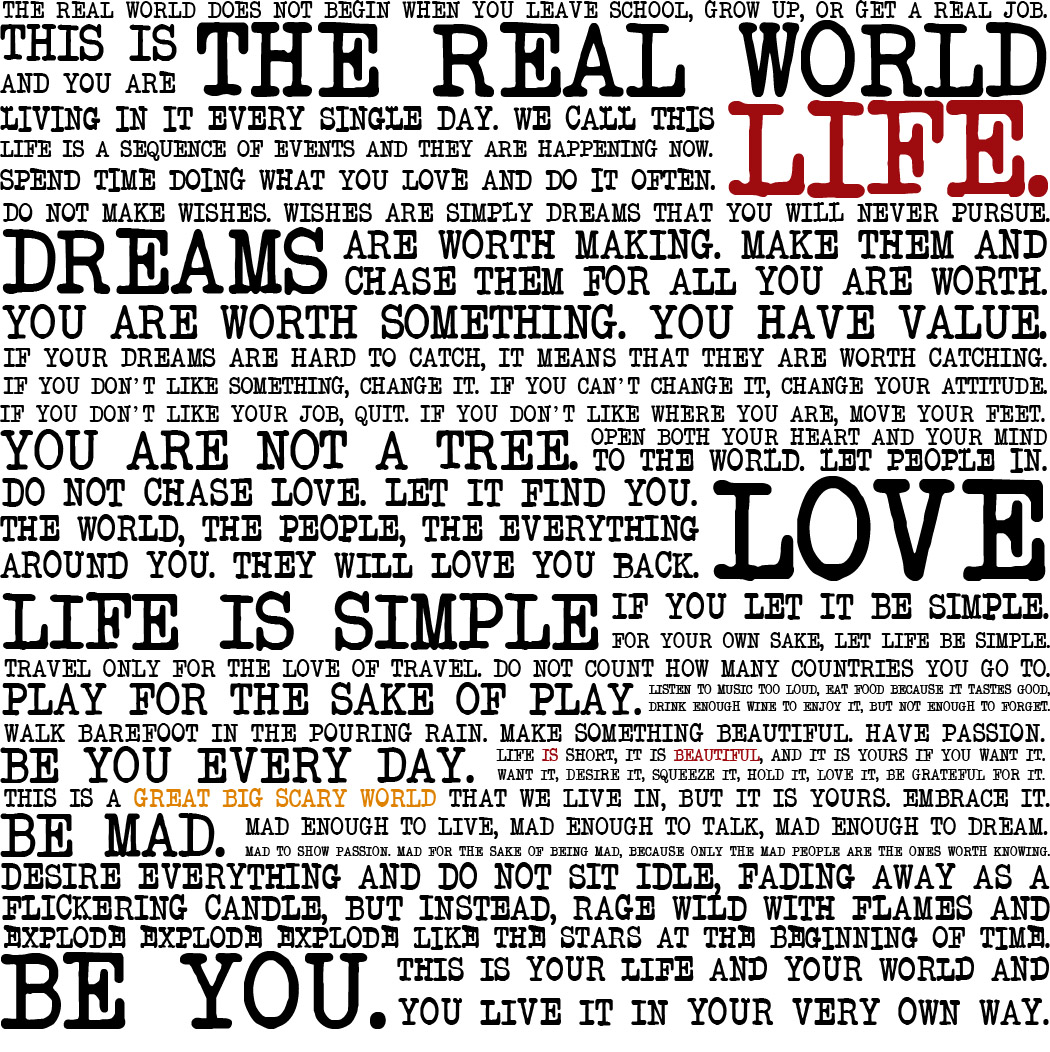
PASSION: WHAT IT IS AND WHY DO YOU WANT IT?
 By definition, passion [as a mass noun is a] strong and barely controllable emotion [whilst singularly it is] an intense desire or enthusiasm for something. Passion is what makes your heart beat and reminds you that you are alive. Passion is what excites you to get out of bed in the morning and what drives you to not give up on life.
By definition, passion [as a mass noun is a] strong and barely controllable emotion [whilst singularly it is] an intense desire or enthusiasm for something. Passion is what makes your heart beat and reminds you that you are alive. Passion is what excites you to get out of bed in the morning and what drives you to not give up on life.
For some of us, it comes easy – for others, not so much. But when you meet someone who is passionately interested in learning and experiencing the world around us, you can feel it, and it is contagious, exciting, and limitless. I cycle through periods of feeling passionate about many things and then fearing that I can’t even begin to scratch the surface of what I want to do. When you feel like this, you never feel bored – there is always more to do, more to see, more to learn, and those are great feelings. I would like to impart this feeling of passion onto others in the hope that they feel the same. That’s what this whole site is about: realising that you don’t have to hold onto the negative influences in your life and that you can hope for ‘something more’, whatever that phrase means to you. ‘Something more’ could be anything from being a world record breaker to making time to sew – only you can define what matters to you.
SO, SHOULD YOU QUIT YOUR JOB?
The whole point of this post is to get you to ask yourself what holds you back in life and what is it that you would rather be doing. It might be a job, it might be something else completely. What takes up your time that isn’t worth giving your time to? This page isn’t really about quitting your job – it is about quitting whatever in life has a negative impact upon your life. For many people, that is their job, but for others, their job is their passion and that gives them a great reason to get up in the morning. Maybe you could use a job that you don’t love to support a life that you do love. As with everything, life is about balance and sometimes you have a ‘job’ you don’t like because the positives outweigh the negatives – supporting a family might be a good example of this.
Far too often, we hold onto negative influences in our lives because we are afraid of what we might lose (when the truth is that we would be getting rid of a bad thing). Fears, anxieties, finance, and social pressures are all examples of this. We need to be aware of these issues, but we don’t want to be crippled by them.
WHAT TO DO NEXT?
If you like reading longer publications, please read The Avant-Garde Life, a free book I published to help others overcome their obstacles. And check out some other pages on this site. The following pages would be rather useful next steps right now:
- Overcoming Adversity: Fear, Finance, and Expectation
- The Search For Adventure: What Is It Anyway?
- How to Fund the Life You Want to Live




